Operation Iron Swords - Day 154 - 08 March 2024
Contents |
|
NEW - War Termination NEW - Operations NEW - Operations - Gaza NEW - Operations - Judea-Samaria NEW - Operations - Lebanon NEW - Operations - Syria / Iraq NEW - Operations - Yemen NEW - Operations Maps NEW - By-Standers NEW - Axis of Resistance NEW - Allied for Democracy UPDATED - By the Numbers |
According to Israeli media, the fears of the Israeli security authorities regarding the upcoming Ramadan season in the West Bank and occupied Jerusalem are rising, amid warnings from the Israelis that Hamas may exploit the most important time for Muslims as an opportunity to ignite the scene. The biblical holidays for the Jews this year intersect with the second week of Ramadan, which may open the door to a new battle in Al-Aqsa Mosque.
Ramadan is celebrated Mar 10, 2024 – Apr 9, 2024. Purim is a Jewish holiday that celebrates the survival of the Jewish people from annihilation in the 5th century BCE. The story is told in the Book of Esther and is known as the Feast of Lots. Purim dates are March 23–24, 2024.
Prime Minister's Office Statement: "At a meeting of all security elements chaired by Prime Minister Benjamin Netanyahu, it was decided: Israel strongly safeguards freedom of worship for all faiths, at all sites in Israel, especially the Temple Mount; Ramadan is sacred to Muslims; its sanctity will be upheld this year, as it is every year. During the first week of Ramadan, the entry of worshippers to the Temple Mount will be permitted, similar to the numbers in previous years. A weekly assessment of the security and safety aspects will be held; a decision will be made accordingly."
At the end of the discussion it was decided that there will be no age limit for entering the Temple Mount, but there will be quotas.
Andrew Silow-Carroll, editor at large of the New York Jewish Week, spoke with Kobi Michael, a senior researcher at the Institute for National Security Studies (INSS) and an expert at the Misgav Institute for National Security and Zionist Strategy, two right-leaning think tanks in Israel.
"In Israeli eyes it means a nation state of the Jewish people, and Palestine is the nation state of the Palestinian people. This is not the Palestinian perspective... the core problem of the conflict: the Palestinian refusal to recognize the right of the Jewish people for self-determination.... A local technocratic administration will be built to govern the Gaza Strip.... That will take no less than five years. And the Palestinian Authority should go through a very significant reform process... the Gaza Strip and the West Bank, will be able to be reunited in a framework of a federation.... But I do not believe that the Palestinian Authority is capable, under the current circumstances, to regain effective control over the Gaza Strip and the reconstruction process....
"The constant victimhood, the insistence on the right of return, which is the other side of the coin of their refusal to accept the right of the Jewish state to exist as a nation state of the Jewish people. Now we’re talking about the fifth generation of Palestinians to be recognized as refugees, and this is the only population of refugees in the world that instead of decreasing is increasing.""
The United States, Qatar, and Egypt are working to reach a truce agreement in Gaza before the month of Ramadan, but the negotiations that took place this week in Cairo did not lead to any tangible results. Al Jazeera sources reported that the Cairo negotiations ended without reaching an agreement, and that the mediators between the Islamic Resistance Movement ( Hamas ) and Israel tried to bridge the gap between the two parties, but their efforts did not succeed.
The sources said that Israel rejected Hamas's request for a permanent ceasefire, the withdrawal of the Israeli army from the Gaza Strip, and the return of the displaced without conditions. For his part, Abu Ubaida - spokesman for the Al-Qassam Brigades (the military wing of Hamas) - called in a statement on “our people in the West Bank, Jerusalem, and the 1948 to mobilize towards Al-Aqsa Mosque ” during the month of Ramadan, and “not to allow the occupation to change the reality on the ground.” He said, "We welcome Ramadan with jihad and bond in a time when men are proud."
Israel announced that the head of its foreign intelligence agency met with his American counterpart as part of efforts to secure the release of prisoners detained in Gaza , while reports indicated disagreements between the political and professional levels that caused the negotiations to falter. Prime Minister Benjamin Netanyahu's office said - in a statement - that " Mossad Chief David Barnea met yesterday (Friday) with CIA Director William Burns as part of ongoing efforts to reach a new agreement to release the hostages."
The statement added that Israel is still communicating with mediators with the aim of reaching an agreement. He added, "At this stage, Hamas is strengthening its positions," claiming that the movement does not seem interested in a deal and is seeking to ignite the region during the month of Ramadan at the expense of the Palestinian population in the Gaza Strip.
While the statement from Netanyahu's office or the official broadcasting authority did not mention the place where Barnea and Burns met, the Israeli Walla website indicated that they met in the city of Aqaba, Jordan. Netanyahu rejected requests from the competent authorities in his government and security services to expand the scope of the mandate granted to the Israeli delegation entrusted with holding discussions in order to conclude a prisoner exchange deal with the Hamas movement. Israeli official radio reported that Netanyahu rejected this because of the opposition of political officials in his government to concluding a prisoner deal and achieving a truce for the fighting in the Gaza Strip.
Israeli Channel 12 said that leaked reports regarding the course of recent discussions conducted by leading entities such as the War Council and the Mini-Ministerial Council revealed that differences in positions between political officials in the government and leaders in the security services are the reason for the faltering negotiations and the failure to achieve a prisoner exchange deal and a truce before a month arrives. Ramadan.
On the other hand, Reuters quoted a source in the Islamic Resistance Movement ( Hamas ) as saying that it was "unlikely" that a delegation from the movement would make another visit to Cairo early this week to hold talks. Hamas blamed Israel for the lack of progress, which refuses to provide guarantees to end the war or withdraw forces from the Gaza Strip.
Yesterday, Friday, Abu Ubaida, spokesman for the Izz al-Din al-Qassam Brigades - the military wing of the Hamas movement - said that the occupation government uses deception and evasion in negotiations and is characterized by confusion and confusion, stressing that the resistance’s highest priority for achieving a prisoner exchange is a full commitment to completely stopping the aggression and the resulting withdrawal. Occupation forces, the return of displaced persons, and reconstruction.
Abu Ubaida addressed the families of the occupation prisoners in Gaza, saying that if they are concerned about the lives of their relatives, they must know that their government and their war council are manipulating the lives of their children and insisting on “receiving them in coffins,” as he put it, adding, “The ball is in their court to save whomever of them can be saved.”
Qatar and Egypt, with the help of the United States, are mediating between Hamas and Israel in order to reach a new ceasefire agreement in Gaza and the exchange of prisoners before the month of Ramadan, but the negotiations have not yielded results so far.
Yesterday, Friday, US President Joe Biden acknowledged the difficulty of reaching a ceasefire before Ramadan.
Israel is constructing a new road and security zone all along the broder wtih the Gaza Strip. According to a CNN report based on an analysis of satellite imagery, the IDF is building a road that splits the Gaza Strip in two from east to west as part of the military's plan to maintain control of the area for many months.
US Central Command said it was aware of reports of civilians in Gaza who were killed as a result of humanitarian aid airdrops, but denied that these deaths were caused by U.S. airdrops. CENTCOM carried out another humanitarian airdrop into Gaza, in which "U.S. C-130s dropped over 41,400 U.S. meal equivalents and 23,000 bottles of water into northern Gaza," in addition to a Friday airdrop made with the Royal Jordanian Air Force.
Ryan McBeth suggested "A sea-based delivery system like JLOTS might not work in Gaza, mainly due to force protection issues. Who protects the American military while they are building it, and once it is built, HAMAS may attack it. However, we can take a page from the coalition idea called the "Sons of Iraq" where we paid Sunni men to form a trained militia, giving them a reason to believe in a stable Iraq. Israel could create and fund this militia force which could take the fight to HAMAS and later become the seed of a new democratic Palestinian government."
US President Joe Biden 's idea of establishing a seaport in the Gaza Strip raises major questions about the mechanisms for its implementation and the real goals behind it, especially as it comes amidst the worsening suffering of the population due to famine, resulting from the siege imposed on the Strip and the Israeli aggression that has continued for 155 days.
During his State of the Union address, Biden said that he had assigned the US army an emergency mission to establish a pier on the Gaza coast under the pretext of delivering large quantities of humanitarian aid. Immediately, British Foreign Secretary David Cameron announced that his country would cooperate with the United States to open a sea corridor to deliver aid directly to Gaza.
Until now, the Islamic Resistance Movement ( Hamas ) has not issued any position in this regard, except for statements by the leader Muhammad Nazzal to Al Jazeera Mubasher, during which he said that the proposal “is still ambiguous and raises many questions.” He continued, saying that the American administration’s proposal to build the seaport at this particular time requires many details about the port’s missions, its management, and the occupation’s position on it. He said that the proposal “contains contradictions that are neither understood, nor justified, nor explained.”
But he added at the same time, "Hamas submitted a request to build a sea port to and from the Gaza Strip in order to avoid the problems we faced at the crossings, and this request was always rejected."
Yesterday, Friday, the UN Special Rapporteur on the Right to Food, Michael Fakhri, denounced the American proposal, and said during a press conference in Geneva that it was “the first time I have heard anyone say that we need to use a sea pier. No one has asked for a sea pier, neither the Palestinian people nor the humanitarian community.” Fakhri described the American proposal as “malicious” and came in respose to electoral interests, pointing out that the United States is at the same time providing bombs, ammunition, and financial support to Israel.
Fakhri described the American proposal as "malicious," pointing out that the United States is at the same time providing bombs, ammunition, and financial support to Israel. He believed that the American desire to establish a port aims, above all, to respond, with the approaching elections in the United States, to the internal pressures exerted by a part of the Americans. The expert added that the matter targets a national audience. He said, "What gives me hope is the increasing movement all over the world, especially in the United States, of people demanding a ceasefire."
Fakhri said, "We said in the past that famine is imminent, but I think it is fair to say now that Israel has deliberately starved the Palestinian people in Gaza, and that famine is already occurring or is on the verge." He continued "We started to see children dying from malnutrition," he added. "We have never seen an entire civilian population driven to hunger so quickly". He also pointed out that Israel is destroying the food system in Gaza, pointing to agricultural lands, orchards, and even fishing boats.
Commentators who Al Jazeera Net spoke to considered that what Biden is doing is nothing but a new attempt at evasion in his quest to find balance in an unbalanced war in the Middle East. Biden also reiterates that he is "the first Zionist president of the United States" with his full and unconditional support for Israel. In addition, these are internal political electoral calculations that Biden fears will cost him the opportunity to remain in the White House for another 4 years.
There is ample evidence that Biden has become increasingly frustrated with Israeli Prime Minister Benjamin Netanyahu 's defiance of his pleas to do more to protect civilians in Gaza, but he remains opposed to halting the supply of munitions to Israel or exploiting its complete dependence on the United States to influence the course of the fighting.
Aaron David Miller, an expert at the Carnegie Endowment for International Peace and former American negotiator in the Middle East peace negotiations, said in a tweet on the X platform, “The Israeli government is unwilling and unable to facilitate the arrival of more humanitarian aid to Gaza as a result of internal political calculations, and they do not.” They care about the suffering of Palestinian civilians or about the future of Gaza.”
As for Democratic Representative from California, Ro Khanna, he said in an interview the day after Biden delivered his speech that “you cannot have a policy of providing aid and giving Israel weapons to bomb food trucks at the same time.” He added, "There is an inherent contradiction in that, and I think the administration needs to reconcile the real compassion and moral concern shown last night for the lives of Palestinian civilians with real accountability for Netanyahu and the far-right government there."
Pentagon spokesman Pat Ryder had said that there would be no American forces on the ground in Gaza, but the American army would help build a dock and bridge to transport aid. He explained that construction of the corridor will take about 60 days, but once in place, it is expected to be able to provide approximately two million meals per day.
Khaled Al-Jundi, director of the Palestine Program at the Middle East Institute in Washington, tweeted, “Within 60 days, thousands more will die from hunger and disease. The most logical and effective response would be to demand that Israel, which relies entirely on American weapons and support, stop blocking the entry of aid and open the six land crossings to Gaza immediately.”
For her part, international affairs expert Asal Rad indicated that the introduction of any aid into Gaza is welcome, due to the catastrophic humanitarian situation in which children are starving to death. However, the Biden administration has failed to acknowledge Israel's responsibility for the current crisis and the fact that it is using starvation as a weapon of war as Human Rights Watch and other experts have noted.
She told Al Jazeera Net that it is also strange that the United States resorts to such dangerous methods of providing aid, which is usually reserved as a last resort when dealing with hostile countries, and not with allied countries such as Israel, and it is another reflection of its ability to escape punishment and not take any action. The Biden administration has taken no steps to hold it accountable for its actions.
Commentators ruled out that Washington would propose a step to build a temporary water dock without prior coordination with Israel. In an interview with Al Jazeera Net, Wolfgang Postztai, a former diplomat and international affairs expert, indicated that it would be very surprising if Biden had not informed Netanyahu before he made this statement in his State of the Union address. He indicated his belief that the Israelis would not dare to spoil Biden's plans, but they would insist on some kind of security checks to prevent weapons smuggling to Hamas.
In a statement to Al Jazeera Net, Ambassador David Mack, former US Assistant Secretary of State for Middle Eastern Affairs, who previously worked at his country’s consulate in Jerusalem , pointed out the importance of Biden’s announcement, and considered that the sea pier is a more effective means of providing humanitarian aid compared to air drops that do not It helps only a small percentage of Gaza's population. He stressed that the Israelis will give up relatively little control, as they fend off American and international criticism for their harsh stance towards the residents of Gaza, who are in dire need of aid.
For her part, Rad criticized the Biden administration's approval of Israel's security checks and inspections, which reflects her fears that the United States will provide questionable aid. This will slow down the delivery of aid, “which Israel has been doing for months with all aid arriving in Gaza.”
Various opinion polls indicate that a two-thirds majority of Americans want the fighting to stop immediately in Gaza, and the percentage rises to more than 80% among Democrats. Postztay considered that the current opinion polls on the US presidential elections are not very favorable for Biden, who particularly needs more support among American youth, many of whom are strongly critical of his policy towards Israel, and this move is one step to winning them back.
Rad said that despite the internal pressure on President Biden to act, these announcements and actions are merely a public relations operation given that the administration continues to provide money and weapons to Israel without stopping.
As for the Jordanian expert in military and strategic affairs, Hisham Khreisat, he said in statements to Al Jazeera that despite the “humanitarian aspect” of what Biden announced, there is another aspect to the floating port related to encouraging voluntary Palestinian migration to Europe, and canceling any role for the Rafah land crossing on the border with Egypt.
On the other hand, observers believe that entering the Gaza situation through humanitarian aid and relieving the population is an integrated program that belongs to an American-Israeli vision and is shared by Arab parties. It is the second stage after severe starvation by imposing an American-sponsored mechanism to address the hunger crisis to neutralize the role of the Hamas movement in the Gaza Strip.
In this regard, writer and political analyst Abdullah Al-Aqrabawi says that if the introduction of food in particular is intensive and organized, "this will not be an easy way to implement their plan to gradually remove the Hamas movement from the equation." He added in his interview with Al Jazeera Net, “In the issue of hunger, you cannot prevent people from food and you cannot stand in the way of their relief,” but the truth is that this port or sea corridor “is not what the Hamas movement was demanding to break the siege on the Gaza Strip, and the port may constitute The US is a tool to tighten the siege on the Palestinians.”
Al-Aqrabawi warned against this “occupation port,” saying that if the American army was allowed to enter the borders of Gaza, this would be a very dangerous step. "It should not be welcomed at all." He continues that the United States will not allow any "presence of the movement and its institutions in the port mechanism, as it is a direct tool for tightening control over people through starvation and then feeding." According to American statements, the sea bridge needs weeks to operate. The US Department of Defense ( the Pentagon ) announced that the process of building the floating port will take 60 days, and more than a thousand soldiers will likely participate in it, and according to European estimates, it can transport the equivalent of only 200 trucks daily".
Writer and political researcher Muhammad Ghazi Al-Jamal believes that the port in this way does not provide half of the sector’s daily needs, and does not constitute a radical solution to the humanitarian crisis, “while the solution lies in exerting sufficient pressure on the occupying state to bring in aid by land in the appropriate amount.”
He said in statements to Al Jazeera Net that the United States fears the repercussions of the deteriorating humanitarian conditions in the Strip, because of its potential impact on its interests and forces in the region and around the world. He adds that at the strategic level, the human rights file has been an essential tool for the work of American foreign policy and a justification for military interventions and economic sanctions against many countries of the world, and it fears the impact of its silence and complicity with the crimes of the occupation in Gaza on the effectiveness of this strategic tool in its policy in the future, especially in the conflict with China.
On the other hand - the writer adds - the Israeli government does not show sufficient understanding of this American need, and focuses instead on efforts to displace the population of the northern Gaza Strip, negotiating pressure on the resistance using the weapon of starvation, and placing obstacles in the way of the arrival of aid by land, with the aim of undermining the presence of any civil authority. Thus undermining the components of cohesion and resilience in the sector.
He said in the face of this situation, “The American administration finds no alternative to direct intervention to protect its immediate and strategic interests, and it also believes that this is a real interest for the occupying state, even if the Netanyahu government does not value it as much as it does.” Israel was not far from these arrangements, as the Israeli media quoted a senior Israeli official whose name was not revealed as saying that Tel Aviv supports the establishment of a temporary floating dock to bring humanitarian relief aid to the residents of the Gaza Strip, like the one Biden spoke about.
According to this official, this initiative was discussed between Israel and the United States in the past and they agreed to coordinate its implementation. The Israeli green light to implement this proposal indicates an Israeli interest in it, especially since it will constitute an alternative to the Rafah crossing and will put it out of service, especially since Israel “does not trust the crossing and considers it the main entrance for Hamas’ weapons.”
He also indicated that Biden is very concerned about what will result from the Israeli army’s invasion of the city of Rafah in the southern Gaza Strip, and about not ending the humanitarian catastrophe in Gaza, which will be reflected in the outcome of the elections in the United States, so he will accelerate the construction of the port.
The American port’s move will appear as pressure on Egypt by underestimating the importance of the Rafah crossing. Despite all the obstacles that Gaza faces in the Rafah crossing issue, in the end it remains an Arab-Palestinian corridor, not an American one, in addition to the presence of a number of interests and intersections that allow Hamas to manage the relationship with Egypt in different circumstances.
The Nouvel Observateur (Lobs) magazine said that a humanitarian catastrophe is unfolding in the Gaza Strip , which is under siege by Israeli forces after 5 months of war, which makes the delivery of aid to the Palestinians there extremely difficult, at a time when the United Nations is sounding the alarm about the presence of “massive famine.” The scope is almost inevitable,” in which the Palestinian Ministry of Health announces the death of about 23 children due to malnutrition and dehydration in Gaza.
The French magazine explained - in a report written by Marie Fiachetti - that the difficulty of delivering aid by land made many countries try to send food and health equipment by air, with the possibility of opening a sea corridor between Cyprus and the Gaza Strip. To clarify, Lobs addresses the issue in 4 questions.
The magazine recalled that the vast majority of ground aid that has arrived in the Gaza Strip since the beginning of the war via trucks enters through two crossings, one of which is the Rafah crossing on the Egyptian border with the Strip and the second is the Kerem Shalom crossing , which trucks cross coming from Israel.
According to the United Nations Relief and Works Agency for Palestine Refugees ( UNRWA ), 14,477 trucks have entered the Palestinian territories through these two crossings since October 21, and according to Israel, the number is 16,093 trucks, at a rate of 105 trucks per day, which is a far cry from the quantities. Enough to help millions of Palestinians in need, according to various humanitarian organizations.
The authority responsible for Palestinian civil affairs (COGAT), affiliated with the Israeli Ministry of Defense, confirmed that the volume that can enter the Strip “is determined in particular by the ability of humanitarian organizations in the Gaza Strip to absorb this aid.” Although traffic jams hinder the entry of trucks, which slows down the delivery process, according to humanitarian organizations, what slows it down even more are the strict restrictions imposed by Israel even before the start of the war, when it was already restricting the entry of so-called “dual-use” equipment, that is, In view, its use for military purposes.
In recent weeks, several heads of state and political representatives have accused Israel of not doing enough to allow the delivery of humanitarian aid, and US President Joe Biden told Israeli Prime Minister Benjamin Netanyahu that “humanitarian aid cannot be a secondary consideration or a bargaining chip.” In a highly critical message towards the Israeli attack and the “humanitarian catastrophe” it is causing, French President Emmanuel Macron described the insufficient access of humanitarian aid to the “population” as “unjustified in an absolute humanitarian emergency,” and called for the opening of the port of Ashdod and the opening of a direct land route from Jordan, as well as “all crossings” in order to deliver aid.
Facing the difficulties of truck passage, many countries dropped some aid by air, such as Jordan, the United States, France, the Netherlands, Belgium and Egypt. However, these airdrops are not enough given the scale of the crisis, as the World Food Program sees it , and what is worse is that some of them led to the death of 5 People west of Gaza City, according to a medical source.
Passage by sea remains another possible alternative - as the magazine says - and indeed, European Commission President Ursula von der Leyen said on Friday that she hopes to open a sea corridor that will make the transfer of humanitarian aid from Cyprus to Gaza possible. Biden also announced a major humanitarian operation by sea, which includes building a temporary dock in Gaza. The Pentagon has determined that the construction of this structure will take about 60 days, and “could provide more than two million meals a day to the citizens of Gaza.” Many humanitarian and political leaders, including the European Union Commissioner for Humanitarian Crises, Janez Lenarcic, believe that trucks, however, remain the most effective method, and are calling for more crossings to be opened.
Military and strategic expert Major General Fayez Al-Duwairi described the statement of the Izz al-Din al-Qassam Brigades - the military wing of the Islamic Resistance Movement ( Hamas ) - regarding the Israeli prisoners as “a very successful message in terms of timing.” Abu Ubaida, spokesman for the Izz al-Din al-Qassam Brigades, revealed the identity of 4 Israeli prisoners who were killed in raids by the Israeli occupation on the Gaza Strip . He said in a statement on his Telegram page: “After examining the identities of the rest of the dead, we confirmed that Itzik Al-Jarat, Alex Densig, Ronen Tommy Angel, and Eliyahu Margalit were killed.”
According to Al-Duwairi, Al-Qassam’s statement is an “eloquent and poignant message” stating that Israeli Prime Minister Benjamin Netanyahu is not concerned about the prisoners, and that their issue is not a priority for him. He believed that the timing of the statement was “very precise and very embarrassing,” especially as it comes after the Cairo ceasefire negotiations in Gaza, which ended without reaching an agreement, and one of the reasons for the failure - according to Al-Duwairi - was the issue of prisoners, as Hamas will not release the prisoners before Ceasefire in Gaza.
The military and strategic expert believes that the temporary truce will not serve either the Palestinian cause or the Hamas movement. He said, “If the American approach gives me 6 weeks with trivial matters in terms of the arrival of food supplies...what then?” The first announcement by the Al-Qassam Brigades regarding the prisoners was published before the Palestinian delegation went to Cairo for negotiations, and it was revealed at that time in a video that 7 prisoners were killed as a result of the Israeli bombing.
In the same context, Al-Duwairi said - in the military analytical pause on Al Jazeera - that the minimum on the list of Israeli goals is the release of their prisoners held by the Palestinian resistance in the Gaza Strip, but they failed to achieve that goal.
Regarding field developments in Gaza, especially the military operations of the occupation in Khan Yunis , south of the Strip, Al-Duwairi said that the occupation army is seeking to find a person, namely the head of the Hamas movement in the Gaza Strip , Yahya Al-Sinwar , even though the Hamas movement and Al-Qassam do not depend on one leader, and they were martyred. Many leaders. The Israeli Broadcasting Authority said that military operations concentrated in Khan Yunis were seeking to find Al-Sinwar.
Al-Duwairi pointed out that fighting between Palestinian resistance fighters and the occupation forces has continued for 3 days in the Hamad area, west of Khan Yunis. Regarding Al-Qarara, north of Khan Yunis, which is witnessing Israeli bombing, the military expert said that its situation is different, because it represents the bottleneck through which supplies pass to the occupation army. He also spoke about the occupation's focus on the central Gaza Strip area, and stressed that during the period of the attack on the camps, the occupation forces were unable to enter the Nuseirat camp, indicating that there is a tendency to reignite the area again.
Operational Update - Judea-Samaria
Operational Update - Syria / Iraq
On January 9, the US Army announced that it and British forces shot down 18 drones and 3 missiles fired by the Houthis towards ships in the Red Sea. London said at the time that this was the largest attack by the Houthis, who control large parts of Yemen, including the capital, Sanaa.
The Ansar Allah group (Houthis) in Yemen announced the implementation of two military operations against an American ship and destroyers, while American and French forces announced the downing of dozens of drones launched by the Houthis. The group's military spokesman, Yahya Saree, said - in a speech - that the group's naval forces and air forces carried out "two qualitative military operations. The first targeted the American ship Propel Fortune in the Gulf of Aden with a number of suitable naval missiles, while the second operation targeted a number of American war destroyers." In the Red Sea and the Gulf of Aden, with 37 drones. He stressed that Houthi operations will continue until the aggression against the Gaza Strip stops.
The Houthis have been attacking ships in the Red Sea since last November in solidarity with the Gaza Strip in the face of the Israeli aggression it has been facing since the seventh of last October.
In contrast to the Houthi announcement of the two attacks, American and French forces confirmed that dozens of drones were shot down in the Red Sea on Saturday. The US Central Command said that it, with the participation of the allies, thwarted a large-scale attack by the Houthis in the Red Sea and Gulf of Aden region, and confirmed that it confronted a large-scale attack by them in the Red Sea and the Gulf of Aden at dawn today, Saturday, and shot down at least 18 drones in the Red Sea.
CENTCOM confirmed that no ships belonging to the US Navy or coalition forces were damaged in the attack by the Houthi marches, which she said posed “an imminent threat to commercial ships, the US Navy, and coalition ships in the region.” It added that the Houthis fired two ballistic missiles from Yemen towards the ship MV Propel Fortune, flying the Singapore flag, in the Gulf of Aden, without causing any casualties or damage.
The French Ministry of Defense also announced that a French frigate and fighter aircraft destroyed - today, Saturday - 4 combat drones in the Gulf of Aden. The Ministry explained - in a statement - that the drones were launched towards a ship belonging to the European Maritime Surveillance Operation in the Gulf of Aden. It added that what was described as defensive work contributed directly to protecting the cargo ship that was subjected to a missile attack in recent days and the process of towing it is continuing, as well as protecting other commercial ships crossing the region.
For its part, the British Maritime Trade Operations Authority also confirmed that the ship Propel Fortune had been subjected to an attempted attack. It said that the shipping company reported two explosions near the bulk carrier, but all crew members are fine, and the tanker is heading to the next port of call. The British authority said in a statement: “According to sources, Propel Fortune was most likely targeted due to outdated US ownership data.” This attack is one of the largest attacks launched by the Houthis on targets in the Red Sea and the Gulf of Aden.
Maps
|
All maps are lies. “Not only is it easy to lie with maps, it is essential,” wrote cartographer Mark Monmoneir in his book How to Lie with Maps. He showed that condensing complex, three-dimensional spaces onto a two-dimensional sheet of paper [in old days] is bound to be reductive. But it is impossible to comprehend the war in Gaza without reference to maps, otherwise the entire conflict is reduced to an endless series of meaningless acts of random violence and the suffering of civilians. The first characteristic of guerrilla warfare is the loss of a front line. Evidently, different mappers have different ideas of how to depict the war in Gaza, notably those that seek to depict Israeli progress in the ground campaign. Part of the problem is latency. The news that forms the basis of the maps takes time to filter out to mappers, and the cartographers take time in crafting their maps, and it takes time to curate them. These processes are uneven among mappers, so their maps may differ in detail. Probably there is some ideological bias, or at least thematic apperception, which is understandable in wartime. It may come as no surprise that al-Jazeera maps depict rather less Israeli territorial progress than other sources. Finally, there remains the epistemological question of just exactly what are the colored in areas depicting. Naively, this might be understood as areas of Israeli control, that are no longer contested by the HAMAS. Or possibly these are areas of Israeli presence, in many of which the possibility of an RPG-wielding HAMAS militant popping out of a tunnel unexpectedly remains a live possibility. With the "zero-range" combat characterized by small unit tactics on both sides, maps may be prey to a fallacy of misplaced concreteness.
|
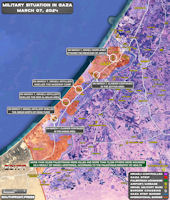
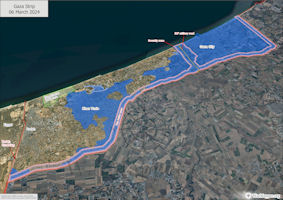
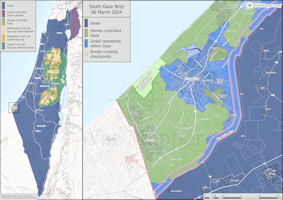
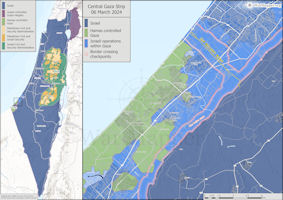
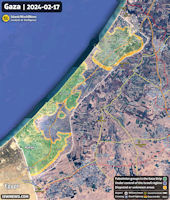
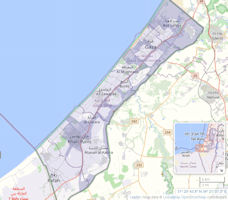
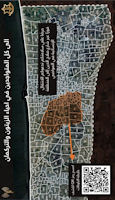
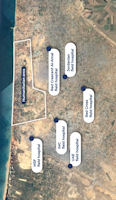
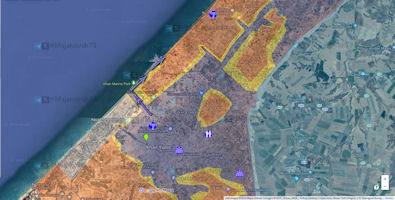
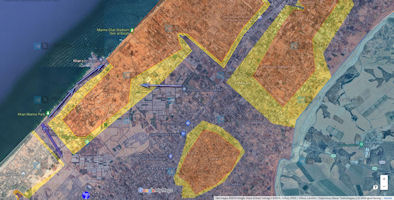
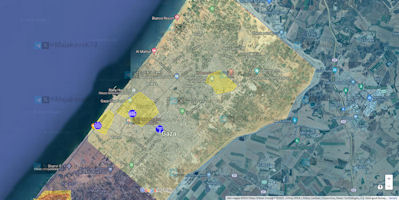
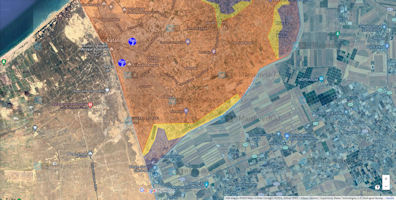
Bystanders
An estimated 8,000 patients need to be medically evacuated from Gaza, including over 6,000 trauma-related patients, according to the World Health Organization (WHO).
Axis of Resistance
The head of the political bureau of the Islamic Resistance Movement (Hamas) , Ismail Haniyeh , appealed to the Arab and Islamic nations to move quickly to stop the Israeli aggression against the Gaza Strip , save the Palestinians, and isolate Israel politically and diplomatically as a result of the war crimes it is committing .
In a message sent by Haniyeh to the leaders, symbols, and scholars of the Arab and Islamic nation, on the occasion of the approaching month of Ramadan, and published by the movement on its account on the Telegram platform, Haniyeh said, “We call on the leaders, symbols, and scholars of the nation to take effective action at the various political, diplomatic, and legal levels, in order to stop the aggression against our people, in particular In Gaza immediately, protect Al-Aqsa Mosque .”
Haniyeh stressed the need to exert pressure on international capitals supporting Israel with the aim of forcing it to stop this war immediately and unconditionally, adding, "Our people welcome Ramadan this year burdened with pain and hopes, and our people are being exposed to the most horrific massacres in the genocidal war on Gaza."
He also stressed in his message the speed of real relief to the Palestinians in terms of food, medicine and shelter, and the opening of the crossings to fully operate, providing the full and urgent needs, completely ending the siege on our people, and beginning a comprehensive reconstruction process. Haniyeh called for more efforts to prosecute the occupation, expose its crimes, and isolate it politically and diplomatically as a result of the war crimes and crimes against humanity it committed in the genocidal massacres in Gaza.
He said, "The occupation is the root of all problems and instability in the region, and its continuation contradicts the principles of international law and the United Nations. The Palestinian people's attainment of their independence and freedom is what ends the root of the problem and establishes a new and different phase at the level of the region and the world."
Allied for Democracy
US President Joe Biden said that reaching a ceasefire in the Gaza Strip between the Palestinian resistance and Israel during the month of Ramadan seems difficult, revealing his frustration with Israeli Prime Minister Benjamin Netanyahu. On the other hand, Biden said that Israel will secure the temporary port to provide aid to Gaza.
In response to journalists' questions about whether he was frustrated with Netanyahu regarding aid, Biden replied, "Yes." Biden also expressed "deep" concern about the violence that could erupt in occupied East Jerusalem during Ramadan.
On Thursday, Biden announced during his State of the Union address that he had issued instructions to the US Army to establish a temporary port on the Gaza coast, adding that more humanitarian aid would enter Gaza by sea through the port without American soldiers setting foot on the territory of the Strip.
A spokesman for the US Department of Defense ( the Pentagon ) said that the port will contribute to providing more than two million meals a day to the residents of the besieged Strip, noting that Washington continues to coordinate with partner countries (which he did not name) regarding the port, including Israel, which will be responsible for the security aspect. Without mentioning more details.
Operation Iron Swords - By the Numbers
- 72,524 Gazans injured
- 40,000 Gazans killed, including buried under rubble
- 33,000 Gaza targets attacked
- 30,960 Gazans martyred
- 15,000 rocket launched from Gaza
- 14,492 Israelis were injured [i24 TV]
- 13,430 Gazan children martyred
- 13,000 HAMAS combatants killed [N12]
- 12,000 HAMAS combatants killed [IDF]
- 11,000 arrested by Israelis in the West Bank in 2023
- 9,000 Palestinians in Israeli prisons
- 9,000 IDF psychological assistance
- 9,000 Gazan women martyred
- 8,000 Gazans missing
- 7,335 arrested by Israelis in the West Bank since Oct.7th
- 6,000 HAMAS combatants killed [HAMAS]
- 5,500 IDF wounded [reports]
- 4,665 West Bank Palestinians wounded
- 3,484 administrative detainees
- 3,400 wanted persons arrested throughout Judea and Samaria
- 2,976 IDF wounded [IDF]
- 1,609 terrorists killed on the first day
- 1,500 wanted persons arrested throughout Judea and Samaria affiliated with Hamas
- 1,200 Israelis killed on the first day
- 575 Israeli officers and soldiers killed
- 431 West Bank Palestinians martyred
- 246 Israeli officers and soldiers killed in Gaza
- 222 Hezbollah fighters killed in Lebanon
- 126 people recovered, including 91 Israelis, 11 bodies, and 24 foreign workers
- 116 living hostages in Palestinian custody
- 50 civilians killed in Lebanon
- 29 IDF deaths were caused by "friendly fire"
- 15 Israelis killed in the West Bank and Israel
Many of these numbers fluctate, up and down, with no apparent explanation. This list records the highest number reliably reported for each matter, under the theory that reality with catch up with reports, as is relentlessly the case.
The Palestinian resistance says that the losses of the Israeli forces are much greater than what is announced. Al Jazeera military and strategic expert Major General Fayez Al-Duwairi expressed his conviction that the numbers of dead and wounded announced by Israel “cannot represent the truth,” due to a discrepancy between the Israeli army’s data and the Walla website, which is close to the army itself.
In an interview with RT, Military strategist retired Tunisian Brigadier General Tawfiq Didi said that the number of Israeli army deaths in the Gaza battles is much greater than what Israel announces. Didi explained in an interview with the “Best Saying” program on RT channel, “The number of people killed in battles can be easily known, as the equation in wars is that for every 3 wounded there is a dead person, and the numbers now in Israel hover around 12,500 wounded and disabled people, and when we divide by Three, we find that the death toll exceeds 4,000, especially after eliminating more than a thousand tanks and armored vehicles, and I know what happens when Kornet missiles hit a tank. Its ammunition explodes and no one is left alive.”
He added, "The Israelis announce their dead only of those of Jewish origin and of the first race, meaning all Arabs, Falash, and those who are among them. They are not counted because they are of the second category. So I am sure that the number exceeds 4 thousand dead, and this is a very easy military calculation."
He pointed out, "The Palestinian resistance documented everything it did, unlike the Israelis. The resistance documented shooting at tanks and armored vehicles and destroying the houses in which the Israeli soldiers were holed up, and we saw them being killed... We saw the Kornet hitting the tanks, we saw Al-Yassin 105, so the difference is clear."
Avera Mengistu and Hisham al-Sayed have been held as hostages in Gaza since 2014 and 2015, respectively. Unlike the roughly 240 people kidnapped in the Hamas October 7 terrorist attacks, the campaign for the release of Mengistu and al-Sayed has received little publicity. Mengistu is known to suffer from what HRW deemed "serious" mental health issues. "Avera crossed one of the safest borders in the world, under the eyes of the security services," recalled Gil Elias, a relative. "We're talking about a mentally ill person who got lost." The calls for the release of Mengistu and al-Sayed have been barely audible during the many years they have been held captive in Gaza.
Lord Roberts of Belgravia (Con) stated 08 February 2024 "My Lords, even if we were to take as accurate Hamas’s statistics and the 27,500 figure — there is no reason why we should; we do not do that with Putin or ISIS — if one subtracts the number of Gazans who have been killed by the quarter or so of the Islamic Jihad and Hamas rockets that fall short, one is left with a less than 2:1 ratio of civilians to Hamas terrorists killed, of whom there have been more than 9,000 so far. War is hell, and every individual civilian death is a tragedy, but — I speak as a military historian — less than 2:1 is an astonishingly low ratio for modern urban warfare where the terrorists routinely use civilians as human shields. It is a testament to the professionalism, ethics and values of the Israel Defense Forces."
|
NEWSLETTER
|
| Join the GlobalSecurity.org mailing list |
|
|
|

